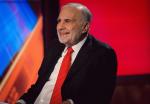For two months, legendary activist investor Carl Icahn has been on the defensive after a short-seller attack sent shares in his investment company down roughly 40%, raising alarms at a handful of major banks that had lent him money as the value of their collateral fell.
Now, after months of negotiating with his lenders, the 87-year-old billionaire is aiming to put the episode behind him and limit potential fallout from future attacks.
Icahn and the banks finalized amended loan agreements that untie his personal loans from the trading price of his company’s shares—a key risk raised by the short-seller—increase his collateral and set up a plan to fully repay the loans in three years, the company said Monday, confirming an earlier report by The Wall Street Journal. The only thing that could now trigger a so-called margin call is movement in the net asset value of his company’s investments, which include companies and stocks.
That should take pressure off the share price by easing fears of forced sales of the stock to meet margin calls.
FTX'S NEW CEO CLAIMS COMPANY LIED TO BANKS FOR YEARS ABOUT MISUSE OF CUSTOMER FUNDS
The shares were up roughly 13% in morning trading.
Shares in Icahn Enterprises, known by its ticker IEP, had been hovering below $30 after short seller Hindenburg Research alleged in early May that the company held assets at inflated prices and was made vulnerable by its founder borrowing against the stock. Before Hindenburg’s report was published, IEP shares were trading above $50.
Icahn owns roughly 85% of the company, which had a market value of $18 billion before the report and $10.7 billion as of Friday. The rest of the shares are primarily held by individual investors.
Roughly 60% of Icahn’s IEP shares were pledged as collateral for personal loans made to him, which prompted his lenders to privately call on him to pledge more collateral as the stock fell.
The episode has been a rare moment of weakness for the feared investor, whose net worth Forbes estimates has dropped around $8 billion since earlier this year. The rapid decline in IEP shares led to speculation that Icahn was forced to liquidate portions of investments as well as calls for him to publicize details of the loans—including from longtime foe and fellow billionaire investor Bill Ackman. Icahn has $3.7 billion in loans and hasn’t liquidated investments to satisfy margin calls, people familiar with the matter said.
PACWEST SELLS LOAN PORTFOLIO FOR OVER $3.5B
Rather, he agreed in the amended loan agreements to provide additional collateral, which will now total roughly $6 billion and include $2 billion of his personal funds that are invested alongside IEP funds in its hedge fund, and roughly 320 million IEP shares.
Icahn also agreed to a repayment plan under which he will pay the banks $500 million in September, eight quarterly payments of $87.5 million beginning a year after that and the remaining balance of $2.5 billion three years from now. His lenders include Bank of America, Morgan Stanley, Bank of Montreal, Deutsche Bank and M&T Bank, according to IEP’s filing Monday.
IEP’s holdings include an oil refinery and a meat-casing producer, among other businesses, as well as an investment unit that houses Icahn’s big bets on companies including biotech firm Illumina, printer maker Xerox and pharmaceutical company Bausch Health.
One outstanding question is how long IEP will keep paying its $2 quarterly dividend, which at the reduced share price represents a more than 25% yield. Icahn receives his dividends in shares rather than cash.
Hindenburg, run by Nathan Anderson, estimated on May 2 in a report titled, "Icahn: The Corporate Raider Throwing Stones from His Own Glass House," that IEP shares were trading at a premium of more than 200% to the reported value of its assets.
Hindenburg came to prominence as a result of well-publicized bets against hydrogen-truck company Nikola and Adani Group, the Indian conglomerate that lost over $100 billion in value after the short seller targeted it in January.
When reporting earnings in May, IEP disclosed it was under investigation by the U.S. Attorney’s Office for the Southern District of New York but didn’t believe it would have a significant impact on the business. It also wrote down the value of one of its holdings, an auto-parts division that had filed for bankruptcy in January.
CLICK HERE TO GET THE FOX BUSINESS APP
As some on Wall Street questioned whether the attack would lessen Icahn’s bite, the octogenarian pushed ahead with a proxy fight at Illumina, which he was pushing to unwind its $7 billion acquisition of cancer-detection company Grail. Illumina’s shareholders elected an Icahn nominee to the company’s board in late May and within a few weeks, its CEO resigned, paving the way for the new regime to consider divesting Grail.


